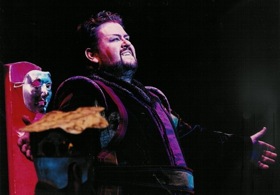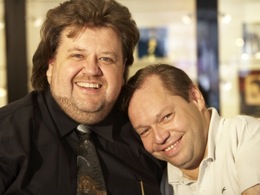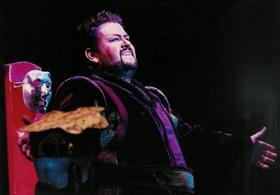
There are a few places in the world where Johan Botha, who is making his San Francisco Opera debut in Verdi's Otello on Nov. 8, is not the most famous man by that name.
Cricket maniacs first think of Johan Botha, 27, whose much-touted career has been marred by allegations of illegal actions, having something to do with the "permitted tolerance level of elbow extension." At this point, it should be clear that I know nothing about cricket (my own low tolerance level has to do with tennis elbow).
However, when it comes to tenors, I do much better, and can testify that "our" Johan Botha, 44, bowls a perfect game on the opera stage.
The tenor is so much coveted by major companies that General Director David Gockley's engagement of him for this most demanding Verdi title role counts as another major casting coup for the newly singer-oriented San Francisco Opera.
Pulitzer Prize-winning Martin Bernheimer is a famously tough critic of singers, but of Botha's Otello at the Metropolitan last year, he had this to say:
Esultate. A new Otello, potentially a great one.Last year, I heard Botha live for the first time, although not at a fortuitous event. He was singing the title role in Brahms' little-known Rinaldo, a youthful, convoluted, rather awful oratorio. The venue was Hamburg, where native son Brahms is so venerated that anything he ever wrote is performed, religiously.Johan Botha, the South African tenor who ventured Verdi’s most challenging protagonist for the first time here on Monday, is a phenomenon. His voice is almost as big as his physique. He has power to spare, never strains, actually makes the words count. He sings the high notes that others fake, and the soft notes that others ignore.
He phrases eloquently, values melodic introspection, rises to the ringing climaxes with steely bravado. He moves with reasonable dignity, yet, more imposing, savours the secret of standing still. Ultimately he defines a telling fusion of urgency and sensitivity, drama and lyricism, storm, and stress.
It would be an exaggeration to claim that Botha already has mastered all the contradictions of the fatally jealous Moor of Venice. Neither brute force nor spontaneity seem within his expressive nature. He sometimes allows tension to dissipate, frequently conveys petulance when one wants fury. But there is time.
Unlike most pretenders to this daunting throne, he commands the right voice, the right technique and, perhaps most important, the right brain.

And yet, even with his nose in the score (unknown to him and every other tenor), and fighting an impossibly written role, Botha's clear, soaring, effortless, forward-set voice was most impressive.
What makes the role of Otello special, besides its requirement of a heldentenor edge for a lyric tenor, and in addition to the impossible challenge of entering the stage with the most difficult opening line in all opera, the big clarion call "Esultate"? For starters, a breathing technique that allows modulation of the voice over the entire tenor range, and the astonishing variety of dynamics covering everything from ppp to fff. In Botha's case, it's "check" and "check."
Under the musical direction of Nicola Luisotti, "born to Otello," this should be a debut to treasure. Botha will be in good company: the Desdemona is Zvetelina Vassileva, a 15-year veteran with San Francisco, where she made her U.S. opera debut in 1994 as Leonora in Il trovatore, returning to the 1995 Ruslan and Lyudmila, and the 1998 L’Incoronazione di Poppea (as Drusilla). Vassileva is replacing her namesake and fellow Bulgarian soprano Svetla Vassileva, who performed as a San Francisco Liu 10 years ago.
As Iago, Italian baritone Marco Vratogna (from Liguria, neighbor to Luisotti's Tuscany) makes his San Francisco debut. Merola alumnus Beau Gibson (originally from Gockley's Houston Grand Opera Studio) and Adler Fellow Renée Tatum will be heard on the mainstage, as Casio and Emilia, respectively.
The Peter J. Hall/John Gunter production from the Chicago Lyric has Stephen Barlow as revival director; his La rondine here two years ago was a big hit.

